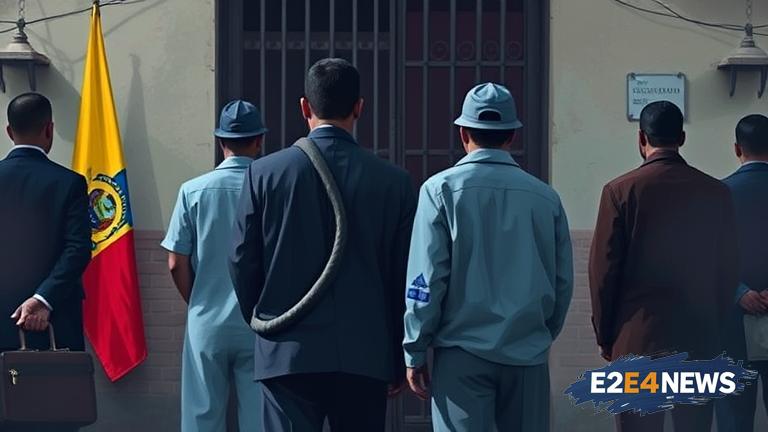In a move that has sparked diplomatic tensions between Ecuador and Colombia, Ecuador has deported more than 600 Colombian inmates from its prisons. The mass deportation has been met with criticism from Colombia, with the country’s government crying foul and accusing Ecuador of violating human rights. The deported inmates were reportedly taken to the border town of Tulcan, where they were handed over to Colombian authorities. The move is seen as a response to Ecuador’s efforts to reduce its prison population, which has been plagued by overcrowding and violence. However, Colombia has expressed concerns that the deported inmates may not receive adequate care and support upon their return. The Colombian government has also accused Ecuador of not providing sufficient notice or coordination prior to the deportation. The incident has highlighted the complex and often contentious relationship between Ecuador and Colombia, with both countries having a history of disagreements over issues such as border security and trade. The deportation has also raised concerns about the treatment of prisoners in Ecuador, with human rights groups criticizing the country’s prison conditions as inhumane. Despite these concerns, Ecuador has defended its decision to deport the Colombian inmates, citing the need to reduce its prison population and improve security. The country’s government has also argued that the deportation is in line with international law and agreements between the two nations. However, the incident is likely to continue to be a source of tension between Ecuador and Colombia, with both countries having different interpretations of the situation. The diplomatic row has also sparked concerns about the potential impact on bilateral relations between the two nations. Ecuador and Colombia have a long history of cooperation on issues such as trade and security, but the deportation incident has highlighted the challenges and complexities of their relationship. The incident has also raised questions about the role of international organizations such as the United Nations in mediating disputes between nations. As the situation continues to unfold, it remains to be seen how Ecuador and Colombia will resolve their differences and address the concerns surrounding the deportation. The incident has also sparked debate about the need for greater cooperation and coordination between nations on issues such as prison reform and human rights. In the meantime, the deported inmates are likely to face significant challenges as they reintegrate into society in Colombia. The Colombian government has pledged to provide support and assistance to the deported inmates, but it remains to be seen how effective these efforts will be. The incident has also highlighted the need for greater investment in prison reform and rehabilitation programs in both Ecuador and Colombia. As the two nations continue to navigate their complex relationship, it is clear that the deportation incident will have significant implications for bilateral relations and regional stability. The international community will be watching closely as the situation unfolds, with many calling for greater cooperation and dialogue between Ecuador and Colombia. In the end, the deportation incident has sparked a critical conversation about the need for greater cooperation and coordination between nations on issues such as human rights and prison reform. The incident has also highlighted the challenges and complexities of international relations, and the need for nations to work together to address common challenges and promote regional stability. The situation remains fluid, with many uncertainties and unanswered questions. However, one thing is clear: the deportation incident has significant implications for Ecuador, Colombia, and the wider region, and will likely be a major topic of discussion in the days and weeks to come.
